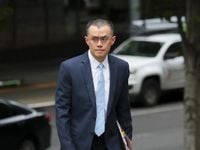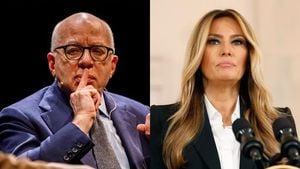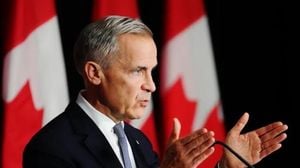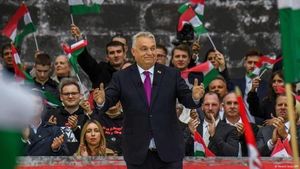In a week marked by bold moves from the White House, President Donald Trump’s latest string of pardons and commutations has reignited fierce debate over the boundaries of presidential clemency, political loyalty, and the future of financial regulation in the United States. From the corridors of power in Washington to the digital frontiers of cryptocurrency, Trump’s decisions have sent shockwaves through legal, political, and business communities alike.
On October 23, 2025, President Trump granted a high-profile pardon to Changpeng Zhao, the founder of the cryptocurrency exchange Binance. Zhao’s legal troubles were no minor matter: he pleaded guilty in November 2023 to failing to maintain an effective anti-money-laundering program at Binance, a lapse that federal prosecutors said allowed criminals to use the platform for illicit transactions, including those linked to child sex abuse, drug trafficking, and terrorism. The case was resolved with a record-breaking $4.3 billion settlement, after which Zhao stepped down as Binance’s CEO and served a four-month jail sentence—a punishment some observers considered relatively lenient given the scale of the violations.
According to CNBC, the pardon signals a dramatic shift in federal cryptocurrency enforcement policy and reflects Trump’s campaign promises to foster blockchain innovation. White House Press Secretary Karoline Leavitt described the move as part of an effort to reverse what the administration sees as overreaching prosecutions by the previous government. "Zhao had requested a pardon, and the White House asserted that he had been persecuted by the Biden administration," Leavitt said, framing the prosecution as politically motivated and targeting the burgeoning crypto industry.
During his plea in court, Zhao expressed remorse, stating, "I failed here… I deeply regret my failure, and I am sorry." His contrition, however, did little to quell the controversy swirling around the pardon. Critics argue that granting clemency to someone who admitted to enabling money laundering undermines accountability for financial crimes. Supporters, on the other hand, say the president’s decision removes unnecessary barriers to legitimate business and innovation in the cryptocurrency sector.
Complicating matters further, Zhao’s connections to the Trump family’s own cryptocurrency venture, World Liberty Financial, have raised eyebrows across the political spectrum. As reported by various outlets, World Liberty Financial generated over $57 million for Trump in 2024 and recently launched a stablecoin, ‘USD1,’ pegged to the U.S. dollar. Just days before the pardon, the company announced that an investment fund in the United Arab Emirates would use $2 billion of the stablecoin to acquire a stake in Binance. Trump’s family crypto enterprise has reportedly garnered approximately $4.5 billion since the 2024 election, benefiting from a partnership with a trading platform managed by Binance. The intertwining of presidential clemency, family business interests, and global finance has fueled accusations of self-dealing and conflicts of interest from Trump’s critics.
The Zhao pardon is not an isolated case. In a series of recent actions, Trump has exercised his clemency powers to benefit several political allies and high-profile figures. Just one week before pardoning Zhao, Trump commuted the sentence of former New York Congressman George Santos, who had been convicted of identity theft and wire fraud. Santos, a prominent Trump loyalist, faced a seven-year prison sentence before Trump intervened with what ABC News described as an “immediate commutation of his entire sentence to time served with no further fines, restitution, probation, supervised release, or other conditions.”
Despite the commutation, legal troubles may not be over for Santos. Nassau County District Attorney Anne Donnelly, who led the original investigation and prosecution, stated on October 21, 2025, her unwavering commitment to prosecuting political corruption regardless of political affiliation. “Since first learning of George Santos’ actions, I have been at the forefront of bringing him to justice,” Donnelly said, as reported by ABC News. “While the office cannot comment on ongoing investigations, suffice it to say that I remain focused on prosecuting political corruption wherever it exists.” Santos, for his part, told CBS News New York that he was unaware of any pending legal actions against him and expressed hope that further prosecution was not a priority.
Trump’s approach to crime and punishment has been anything but conventional. His administration, while emphasizing a tough law-and-order stance—highlighted by military strikes on alleged drug-cartel vessels and the deployment of the National Guard in American cities—has also issued a series of pardons and commutations that often favor political allies and figures from the business world. This duality was on display at a recent White House event focused on crime prevention. When pressed about whether pardoning individuals involved in the January 6, 2021 Capitol riot undermined his law-and-order agenda, Trump dismissed the criticism. “No, you have thousands of people who we’re dealing with and if one goes haywire,” he said, according to event coverage. He also referenced a scandal involving Virginia Democrat Jay Jones, who had sent a threatening text about a GOP lawmaker, rhetorically asking, “So now do you think all Democrats should be prohibited from living anymore?”
Immediately after taking office, Trump pardoned more than 1,500 people charged in the January 6 riot—an attack aimed at blocking the certification of Joe Biden’s 2020 election victory. Among those pardoned was Christopher Moynihan, who had received a 21-month prison sentence for his role in the riot but was freed after Trump’s mass pardons on day one of his term. The aftermath has not been without incident: at least 10 other pardoned January 6 participants have since been rearrested, charged, or convicted of crimes ranging from child sexual abuse to plotting to murder FBI agents and reckless vehicular homicide while drunk, according to the Citizens for Responsibility and Ethics in Washington.
Moynihan, in particular, was indicted just days before the White House crime event for allegedly making a terror-related threat tied to a scheduled public appearance by House Democratic Leader Hakeem Jeffries in New York City. Prosecutors say Moynihan was among the first to enter the Capitol grounds on January 6 and was heard chanting, “And we’re (expletive) in! (Expletive), yeah. Every single one of you is a patriot! Remember that. Restore this republic. Down with communism. Down with communism. Down with Biden. We will restore our republic.”
Trump’s recent clemency decisions have drawn sharp criticism from Democrats and legal scholars, especially regarding the use of military and National Guard deployments in cities—a tactic some argue lacks clear legal authority. Local entities have challenged the use of troops in law enforcement roles, questioning both the legality and the wisdom of such measures.
As the dust settles, the nation is left to ponder the implications of a presidency that wields the pardon power as both a political tool and a signal of policy direction. Whether Trump’s approach will embolden innovation and business or erode public trust in the rule of law remains an open—and fiercely contested—question.





